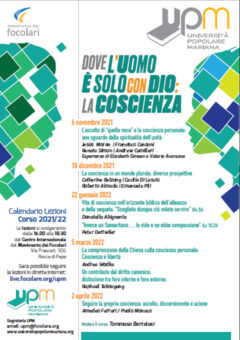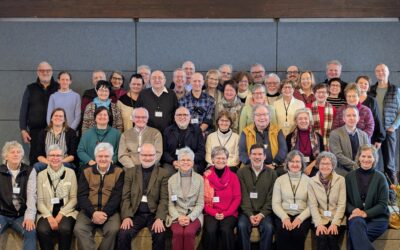The cycle of lessons of the new course of the Popular Marian University (UPM) of the Focolare Movement was inaugurated on 6 November 2021. This year the title is, “Where man is alone with God: conscience”. Catherine Belzung, neuroscientist and Emanuele Pili, lecturer, will give the second lesson. Here they answer some questions.  “Conscience is the most secret core and sanctuary of a man. There he is alone with God, Whose voice echoes in his depths.” These words from the Pastoral Constitution Gaudium et Spes inspire the title of the new course of the UPM (Popular Marian University) of the Focolare designed for the 2021-2022 academic year: “Where man is alone with God: conscience”. On 6th November, during the first lesson of this cycle, Renata Simon, co-responsible for the aspect of Wisdom and Study of the Focolare Movement, described moral conscience as a “holy” space. She said, “Conscience does not close man into an impenetrable solitude, as in an isolated cell, but opens him to the call of God”. Analyzing the theme in its various forms and in the context of the spirituality of unity, reflecting on the ability to act according to the responsibility of each person to enter into dialogue with themselves and with this voice, are just some of the objectives that this course aims to achieve. Catherine Belzung, a neuroscientist and Professor of the “Imaging & Brain” Department of the François Rabelais University of Tours (France) and Emanuele Pili, Adjunct Professor of the Department of Theology, Philosophy and Human Sciences of the Sophia University Institute, agree that this is a great challenge, especially in today’s world. They are both speakers for the second lesson which will take place on 18th December, on the topic: Consciousness in a pluralistic world, different perspectives. The lesson will deal with psychological aspects in relation to moral conscience, introducing the question of freedom and its possible conditioning, which will be examined more closely in the third lesson. “Each of us finds ourselves having to choose according to values and we find this in various disciplinary perspectives”, explains Catherine Belzung. “What often varies are the concepts and the language used. In neuroscience we speak of ‘decision making mechanisms’, in other fields of ‘moral conscience’. We must engage in dialogue to understand if the various words used correspond to a common concept”. Are we neurologically conditioned in acting or are we free? Catherine Belzung affirms, “We are completely free people”. Some research has been misinterpreted and identifies man as a puppet in the hands of his own genetic material, of his own brain. In reality, we are not determined by our biology”. Understanding what hinders listening to oneself and listening to God’s voice in a noisy reality like the one in which we live, seems to be the real question. According to Emanuele Pili, “The time in which we live is so noisy and frenetic, that at times it is like having a suffocating hood around our most intimate and authentic desires. The pervasiveness and omnipresence of technology change the very process through which personal identity is formed. Therefore, there is a real challenge to listen to our most inner part which is not easy to deal with”. How can we get out of this impasse? Emanuele Pili continues, “I believe the point lies in finding a way to pierce the hood that tends to hinder the possibility of returning to ourselves. I think that a lot has to do with the rediscovery, also helped by the experience of the pandemic, of real and simple relationships, lived in their corporeal and emotional dimensions, capable of leaving aside superficiality and mediocrity (…) Rediscovering our interiority and the desire that animates it, is the serious (…), game of everday life. Perhaps, today, piercing the hood that prevents us from accessing our interiority also, and above all, involves knowing how to listen to this cry, which is sometimes mute or stifled, of which for example younger people are, in good and in bad, the most lively and effective testimony”.
“Conscience is the most secret core and sanctuary of a man. There he is alone with God, Whose voice echoes in his depths.” These words from the Pastoral Constitution Gaudium et Spes inspire the title of the new course of the UPM (Popular Marian University) of the Focolare designed for the 2021-2022 academic year: “Where man is alone with God: conscience”. On 6th November, during the first lesson of this cycle, Renata Simon, co-responsible for the aspect of Wisdom and Study of the Focolare Movement, described moral conscience as a “holy” space. She said, “Conscience does not close man into an impenetrable solitude, as in an isolated cell, but opens him to the call of God”. Analyzing the theme in its various forms and in the context of the spirituality of unity, reflecting on the ability to act according to the responsibility of each person to enter into dialogue with themselves and with this voice, are just some of the objectives that this course aims to achieve. Catherine Belzung, a neuroscientist and Professor of the “Imaging & Brain” Department of the François Rabelais University of Tours (France) and Emanuele Pili, Adjunct Professor of the Department of Theology, Philosophy and Human Sciences of the Sophia University Institute, agree that this is a great challenge, especially in today’s world. They are both speakers for the second lesson which will take place on 18th December, on the topic: Consciousness in a pluralistic world, different perspectives. The lesson will deal with psychological aspects in relation to moral conscience, introducing the question of freedom and its possible conditioning, which will be examined more closely in the third lesson. “Each of us finds ourselves having to choose according to values and we find this in various disciplinary perspectives”, explains Catherine Belzung. “What often varies are the concepts and the language used. In neuroscience we speak of ‘decision making mechanisms’, in other fields of ‘moral conscience’. We must engage in dialogue to understand if the various words used correspond to a common concept”. Are we neurologically conditioned in acting or are we free? Catherine Belzung affirms, “We are completely free people”. Some research has been misinterpreted and identifies man as a puppet in the hands of his own genetic material, of his own brain. In reality, we are not determined by our biology”. Understanding what hinders listening to oneself and listening to God’s voice in a noisy reality like the one in which we live, seems to be the real question. According to Emanuele Pili, “The time in which we live is so noisy and frenetic, that at times it is like having a suffocating hood around our most intimate and authentic desires. The pervasiveness and omnipresence of technology change the very process through which personal identity is formed. Therefore, there is a real challenge to listen to our most inner part which is not easy to deal with”. How can we get out of this impasse? Emanuele Pili continues, “I believe the point lies in finding a way to pierce the hood that tends to hinder the possibility of returning to ourselves. I think that a lot has to do with the rediscovery, also helped by the experience of the pandemic, of real and simple relationships, lived in their corporeal and emotional dimensions, capable of leaving aside superficiality and mediocrity (…) Rediscovering our interiority and the desire that animates it, is the serious (…), game of everday life. Perhaps, today, piercing the hood that prevents us from accessing our interiority also, and above all, involves knowing how to listen to this cry, which is sometimes mute or stifled, of which for example younger people are, in good and in bad, the most lively and effective testimony”.
Maria Grazia Berretta




0 Comments